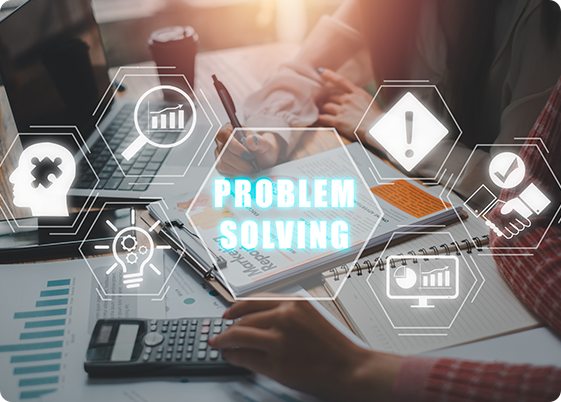Steps to Improve Problem Solving Skills in Customer Service Job
In every industry, it is very impressive when you master certain soft skills that are universally admired and valued. Problem-solving skills are one such set of skills that every employer desires in various positions, be it customer service job, customer support, or any other. However, the ability to solve problems well doesn’t come naturally; it requires much patience, effort and consistent practice. When thinking of developing problem-solving skills, it is important to actively seek out opportunities to resolve issues and embrace a growth mindset.
Why do you Need to Improve Problem Solving skills?
There is an abundance of problem-solving skills benefits that a company can gain from. These skills are really important for candidates seeking a job in the Business Process Outsourcing (BPO) industry. When you interact with the customers, you will be presented with thousands of queries that you will have to address. Now, if you are new to the business, it can become difficult to understand the process and so, this is where the problem-solvers step in to deal with complex business challenges, tight deadlines, and changing variables, but also excel at explaining solutions to customers in a clear and concise manner. This ensures a positive customer experience, which is crucial in the BPO industry.
Understanding problem-solving skills
In the fast-paced world of customer service, problem-solving skills are the cornerstone of success. Customer service representatives (CSRs) face a constant stream of challenges, from resolving technical difficulties to calming frustrated customers. The ability to identify, analyze, and address these issues efficiently and effectively is paramount in delivering exceptional customer experiences.

Deep Understanding
One of the major skills in a customer service role is problem-solving. It begins with a deep Knowledge Base and Resourceunderstanding of the issue at hand. This involves:
- Active Listening: CSRs need to be adept listeners, paying close attention to a customer's concerns without interrupting. Giving customers space to explain their problems allows for a clearer understanding of their needs and frustrations.
- Clarification and Questioning: Asking clarifying questions and summarizing the situation ensures the CSR grasps the full scope of the problem. This may involve confirming technical details, understanding the customer's desired outcome, and identifying any timeline constraints.
- Gathering Information: Leveraging available resources like customer history, product knowledge base, or internal communication channels can provide valuable context for understanding the root cause of the problem.

Short-term Solutions
Once the issue is clearly defined, the CSR needs to focus on immediate solutions, prioritizing customer satisfaction:
- De-escalation: Customers facing problems are often stressed or frustrated. Empathy and active listening can help de-escalate the situation and build rapport. This allows for a more productive and collaborative problem-solving process.
- Offering Options: When possible, presenting multiple solutions provides customers with a sense of control. This demonstrates transparency and allows customers to choose the option that best suits their needs and preferences.
- Knowledge Base and Resources: Utilizing a strong knowledge base of products, services, and troubleshooting steps allows CSRs to quickly identify and implement solutions. Access to internal resources like technical support teams ensures timely resolution for complex issues.

Long-term Strategies
While immediate solutions are important, looking beyond the single interaction is vital:
- Identifying System Flaws: Analyzing recurring problems can help identify weaknesses in processes, systems, or product functionalities. Reporting these issues and suggesting improvements can lead to long-term solutions and prevent similar problems for future customers.
- Proactive Communication: Keeping customers informed about ongoing efforts to address larger systemic issues demonstrates transparency and builds trust. This can be done through follow-up emails, updates on social media posts, or automated notifications.
- Documentation and Knowledge Sharing: Documenting solutions and problem-solving techniques within a central knowledge base allows other CSRs to learn from successful approaches.

Opportunity Identification
Problem-solving skills benefits go beyond simply resolving issues. They can also be used to identify opportunities for improvement: :
- Customer Feedback as a Tool: By analyzing customer feedback, both positive and negative, CSRs can identify areas where the service can be improved. This includes identifying pain points, suggesting product enhancements, or recommending changes to customer support channels.
- Building Customer Loyalty: Prompt and effective problem-solving fosters positive customer experiences. This builds trust and loyalty, encouraging customers to return and recommend the company to others.
- Innovation and Continuous Improvement: Analyzing trends in customer problems can spark innovation within the organization. This might lead to the development of new products and services, improved self-service options, or streamlined customer support processes.
Steps to Improve your Problem-solving Ability
If you’re looking ahead to improve your ability, here are the 5 steps of problem-solving skills development. Here are the steps that you need to follow to improve your problem-solving ability
Interpreting the Problem
Rather than fueling the problems through different aspects, it is important that you understand it thoroughly. It requires the application of your knowledge, skills, and experience. While interpreting the problems, you build the thinking skills that help you identify the possible solutions to a particular problem. It is most important to understand the issue well before attempting to fix it. A deep understanding of the issue paves the way for crafting effective solutions, ensuring you don't just fix the symptoms but address the root cause.
Brainstorming
Brainstorming is a powerful way to improve your problem-solving ability while creating a myriad of effective solutions to the problem. Taking ideas from your peer groups encourages teamwork and furthers assists with deriving solutions. When you assess all the aspects of a problem, it triggers your critical thinking ability and you will eventually get better at it.
Analysing
This is another step towards problem-solving skills improvement where you have to evaluate your ideas and thoughts for the best possible solution. Putting in your logical thinking helps you analyse the problem and applying the most effective solution.
Risk Management
To improve your problem-solving skills, you will need to anticipate the solution as it helps to avoid the downsides of the key solutions. Evaluating potential outcomes can enhance your strategic planning. If you suspect any risks in the solution, you can devise different ways to alleviate them before allowing them escalate and create more problems. Before jumping to a conclusion, it is essential to exercise patience and think about the associated risks. If there are no major risks in a particular solution, it is more likely that that solution will help to curb the issue.
Decision-Making
This is where you call the shots if a particular solution would be effective or not. After dedicating a specific amount of time to understanding & analysing the problems and the solutions, you need to decide on implementing the final solution to the problem.
Career Advancement and Continuous Learning
In customer service, continuous learning unlocks career advancement. Mastering new technologies, product knowledge, and communication skills equips you for promotions, leadership roles, and specialized customer service positions. Invest in learning to climb the customer service career ladder.
Conclusion
Compelling your brain to proceed in this direction certainly improves your problem-solving capability and career advancement in customer service jobs. When you spend time with your peer groups, it develops your listening skills and promotes team building.
The problem-solving ability isn’t confined to freshers or experienced professionals in the workplace. Every individual in the workplace essentially needs to possess the problem-solving capability that contributes to accelerating the career.
Active listening, brainstorming, risk anticipation and management, consistent learning, and effective decision making will you improve problem-solving skills at work.
If you are looking for jobs that give a reputable position in an organization while bringing financial stability, apply for listed jobs at our website right away!
 India
India Canada
Canada Colombia
Colombia Jamaica
Jamaica Philippines
Philippines UK
UK US
US SA
SA



